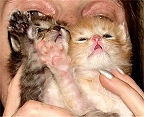Many people have contact with wild animals and, especially if the animals are young, are tempted to take them home as pets. Baby animals are often cute, cuddly and responsive to attention. The temptation to remove them from their natural environment can be very strong, but before you try to make a pet out of a wild animal, please consider the following:
Most wild animals will not live very long in our normal household surroundings. Baby animals that do survive will undergo a drastic behavioral change as they become adults. They often become very aggressive and continually try to escape back to the out-of-doors. A tailor-made pet does not result from declawing, descenting, neutering or removing fangs from a wild animal. In addition, attempting to return such animals to the wild when their behavior becomes intolerable is actually a death sentence.
The dietary requirements of most wild animals are different from domestic pets. An improper diet can result in serious nutritional deficiencies such as rickets and other crippling conditions.
Most wild animals are normally most active at night. This perfectly normal behavior can be very disruptive to persons trying to sleep and attempts to change it may be very frustrating to the animal itself.
Many diseases which affect people can be carried even by healthy-looking wild animals. Rabies is one such disease and others include leptospirosis, tularemia and plague. Preventive vaccines against these diseases are not approved for use in wildlife.
Most wild animals are protected by various federal and state laws and permission from the proper authorities must be obtained before keeping a wild animal.
When you are tempted to take home a wild animal for a pet, ask yourself these questions:
* Is what I am doing legal?
* Am I willing to risk the health, and possibly the life, of myself and my family?
* Am I willing to risk destroying the animal?
* Am I willing to change my lifestyle to conform to the animal's natural and unalterable behavior?
If you cannot truthfully answer "yes" to each question, do not attempt to keep a wild animal as a pet.

